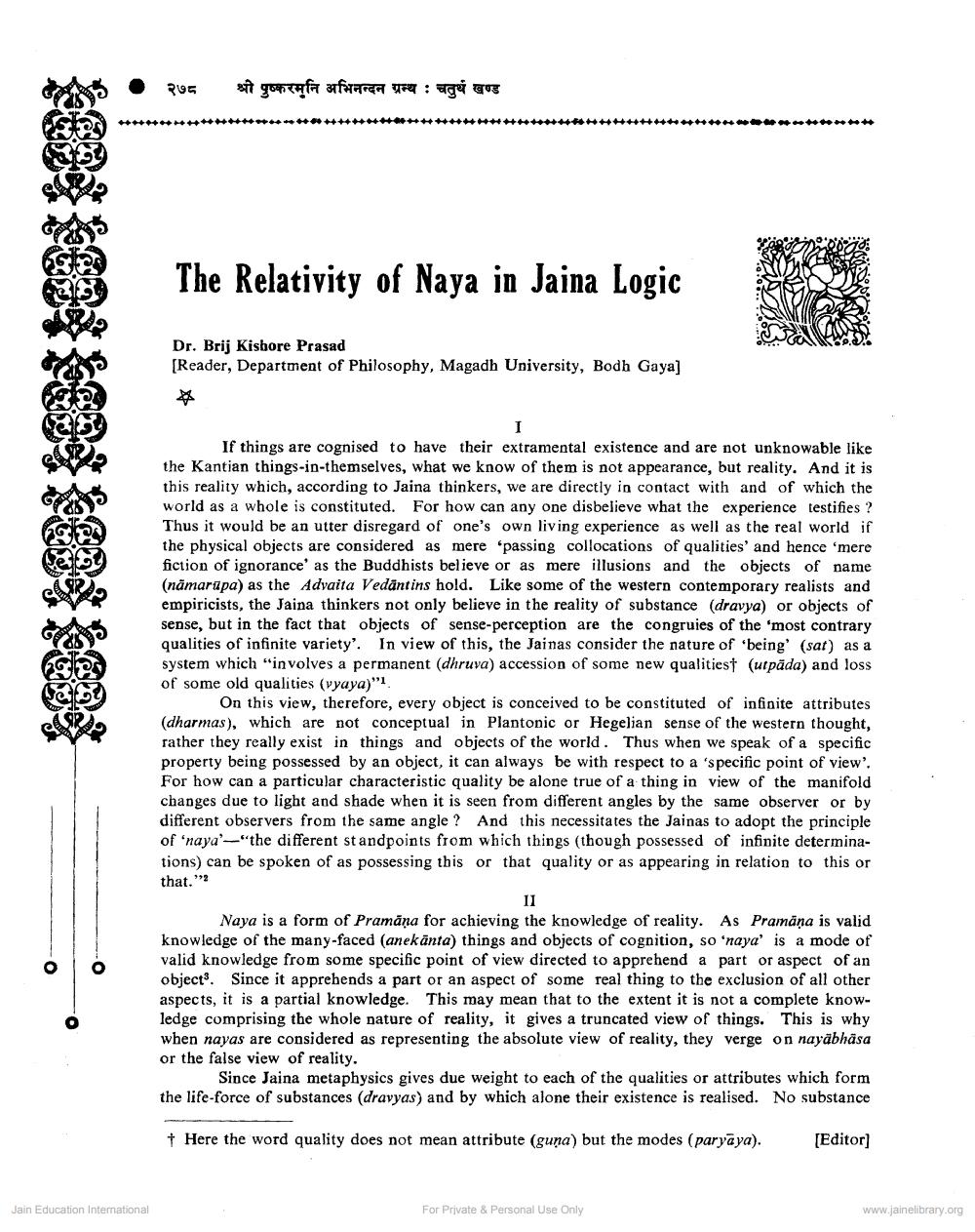________________
-O
Jain Education International
२७८
श्री पुष्करमुनि अभिनन्दन ग्रन्थ : चतुर्थ खण्ड
The Relativity of Naya in Jaina Logic
Dr. Brij Kishore Prasad
[Reader, Department of Philosophy, Magadh University, Bodh Gaya]
*
I
If things are cognised to have their extramental existence and are not unknowable like the Kantian things-in-themselves, what we know of them is not appearance, but reality. And it is this reality which, according to Jaina thinkers, we are directly in contact with and of which the world as a whole is constituted. For how can any one disbelieve what the experience testifies ? Thus it would be an utter disregard of one's own living experience as well as the real world if the physical objects are considered as mere 'passing collocations of qualities' and hence 'mere fiction of ignorance' as the Buddhists believe or as mere illusions and the objects of name (namarupa) as the Advaita Vedantins hold. Like some of the western contemporary realists and empiricists, the Jaina thinkers not only believe in the reality of substance (dravya) or objects of sense, but in the fact that objects of sense-perception are the congruies of the 'most contrary qualities of infinite variety'. In view of this, the Jainas consider the nature of 'being' (sat) as a system which "involves a permanent (dhruva) accession of some new qualities† (utpada) and loss of some old qualities (vyaya)"
On this view, therefore, every object is conceived to be constituted of infinite attributes (dharmas), which are not conceptual in Plantonic or Hegelian sense of the western thought, rather they really exist in things and objects of the world. Thus when we speak of a specific property being possessed by an object, it can always be with respect to a 'specific point of view'. For how can a particular characteristic quality be alone true of a thing in view of the manifold changes due to light and shade when it is seen from different angles by the same observer or by different observers from the same angle? And this necessitates the Jainas to adopt the principle of 'naya'-"the different standpoints from which things (though possessed of infinite determinations) can be spoken of as possessing this or that quality or as appearing in relation to this or that."
II
Naya is a form of Pramāṇa for achieving the knowledge of reality. As Pramana is valid knowledge of the many-faced (anekanta) things and objects of cognition, so 'naya' is a mode of valid knowledge from some specific point of view directed to apprehend a part or aspect of an objects. Since it apprehends a part or an aspect of some real thing to the exclusion of all other aspects, it is a partial knowledge. This may mean that to the extent it is not a complete knowledge comprising the whole nature of reality, it gives a truncated view of things. This is why when nayas are considered as representing the absolute view of reality, they verge on nayabhäsa or the false view of reality.
Since Jaina metaphysics gives due weight to each of the qualities or attributes which form the life-force of substances (dravyas) and by which alone their existence is realised. No substance
† Here the word quality does not mean attribute (guna) but the modes (paryāya).
[Editor]
For Private & Personal Use Only
www.jainelibrary.org




